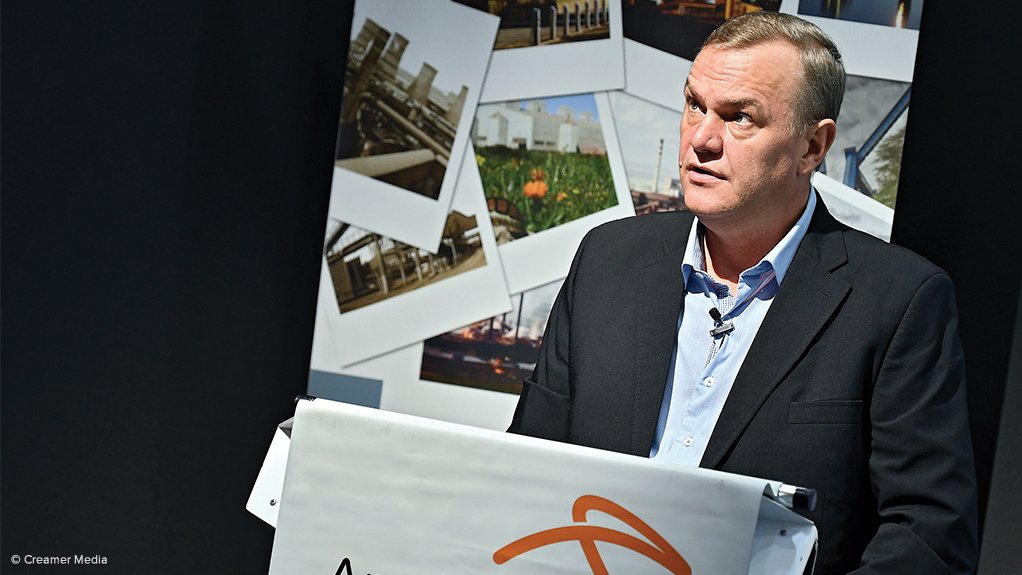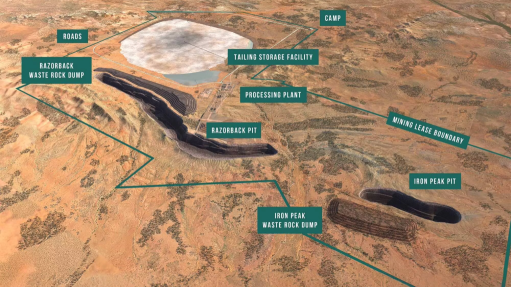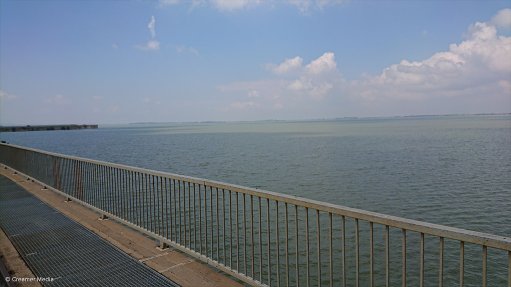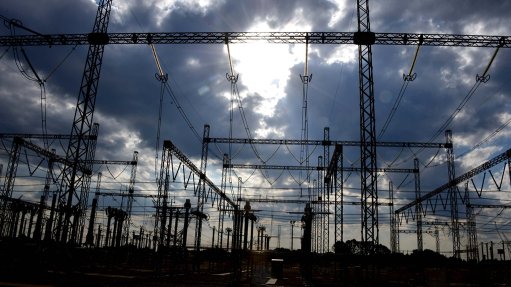AMSA sees plausible pathway for salvaging longs unit, but ready to reverse closure deferral if urgent progress is not made


ArcelorMittal South Africa CEO Kobus Verster
Photo by Creamer Media's Donna Slater
Steel producer ArcelorMittal South Africa (AMSA) has deferred the wind-down of its long-products business by six months amid widespread concern regarding the detrimental impact of the closure on downstream industry and jobs and following consultations with government and other affected stakeholders during which several short-term interventions were agreed.
The deferral announcement was made despite AMSA reporting a R1.89-billion loss for 2023, which represented a dramatic R4.5-billion negative swing from earnings of R2.6-billion in 2022.
CEO Kobus Verster announced the JSE-listed group’s decision to close the longs business on November 28, citing several structural impediments to sustainable operations, and he again warned that these structural constraints had not been removed by some of the short-term interventions currently being pursued during the deferral period.
He also indicated that should there be insufficient progress on any of the elements, AMSA would move to reverse the deferral decision, possibly even prior to the six-month period elapsing.
The deferral was agreed following meetings with Trade, Industry and Competition Minister Ebrahim Patel, as well as Transnet, industry associations, organised labour, affected suppliers, community forums and downstream customers.
AMSA reported that several short-term initiatives were being progressed because of these consultations, including:
- engagements with Transnet leadership on improving port and rail service efficiencies to narrow the current cost gap;
- ongoing discussion with government on its scrap policy, which AMSA cited as a key reason for why its integrated mills could no longer compete, with government’s decision not to extend the export ban on steel scrap in December viewed as the first step in addressing what AMSA has described as an artificial cost advantage to lower-quality scrap-based steelmakers;
- the expediting of demand-side opportunities to improve capacity utilisation in the absence of economic growth, including import replacement as envisaged in the Steel Masterplan;
- ensuring the enforcement of trade protection measures;
- an agreement with key customers to longer-term volume commitments and localisation; and
- working with key suppliers, service providers and organised labour to reduce the cost structure of the longs business.
The JSE-listed group would also apply for an additional working capital facility of up to R1-billion, which could be used to support continued operations during the deferral period.
“The timing of the deferral is subject to these in-principle agreements being commercially and contractually concluded,” Verster said, stressing that there was still a risk that the agreements might not be translated into commercial contracts.
These risks were evidenced by the group’s decision to proceed with its Section 189 retrenchment talks with labour in relation to the longs business, where some 3 500 people are currently employed directly or indirectly.
AMSA has also made proposals to its unions regarding ways to contain costs to sustain the longs operations, including suggestions ranging from retrenchments, to “punitive” wage decreases for longs employees, to cost sharing across all AMSA employees.
Verster rejected suggestions that AMSA was being talked into a deferral by government as a pre-election ploy, saying that the group had been convinced during its consultations with stakeholders that there was a plausible pathway for salvaging the business, and that it was, thus, giving those prospects a “decent shot”.
He reported that there appeared to be a genuine commitment from both government and Transnet to implementing the short-term remedies, which could then open the way for the longer-term initiatives required to provide the longs business with an “end game” that did not involve a permanent closure of the assets.
LONGS END GAME?
Work was already under way to firm up both this pathway to sustainability, as well as the final operating structure.
Verster indicated that the end game could result in all the longs sites in Newcastle, Vereeniging and ArcelorMittal Rail and Structural, in Emalahleni, remaining operational, but with a production profile that emphasised far more value addition and with channels to market that were de-risked through partnerships with downstream companies.
Such a vision would require capital investment, which AMSA also aimed to pursue in partnership with others.
Verster stressed that urgent progress had to be made across several interventions simultaneously if the foundations were to be laid for such an outcome, including changes to government’s scrap policy, dramatic rail and port improvements, as well as demand-side guarantees.
The expiration of the scrap ban in December had already resulted in higher prices, but AMSA also wanted the prevailing tax to be abolished to improve the prospects for its integrated operations.
Patel had indicated that he was not able to make unilateral changes to the policy and that processes would have to be followed if the current policy was to be overhauled.
AMSA is also keen to see significant progress on the logistics, power and crime crises, which were adding significant cost to its operations.
During 2023, these “abnormal costs” were calculated to be R750-million, R580-million of which arose directly from the underperformance of Transnet, including its failure to deliver iron-ore to Newcastle by rail, which resulted in a five-week shutdown of the blast furnace.
The other costs were attributed to ongoing cable theft (R110-million) and an increase in security costs (R60-million) to combat criminality in and around its operations.
The business had also been severely affected by power disruptions in 2023, with 51 load curtailment instructions received from Eskom during the year, up from eight in 2022.
The company was, thus, pushing ahead with its plan to invest in a 200 MW solar photovoltaic facility, which would be funded primarily by the bigger ArcelorMittal Group, owing to AMSA’s own balance sheet pressures.
Verster reported that there had been a delay in securing the necessary grid connection agreement from Eskom, but that progress had been made to secure a contractor to build the solar farm, construction on which could begin in the second quarter.
The Department of Trade, Industry and Competition welcomed AMSA decision to defer the closure of its long-products business, noting that the move followed extensive discussions with the company since December.
"Government has engaged the leadership of the firm as well as its customers and suppliers do identify concrete measures that can assist to support primary steel manufacturing in South Africa," the department said in a statement, adding that the deferral offered immediate relief to more than 1 500 workers at the Newcastle Works and its downstream customers.
"The expected improvement in infrastructure spending, coupled with turnaround plans on transport logistics and commencement of trade under the African Continental Free Trade Area, will all play a positive role in strengthening both demand and supply side challenges in line with the objectives of the Steel Masterplan."
Article Enquiry
Email Article
Save Article
Feedback
To advertise email advertising@creamermedia.co.za or click here
Press Office
Announcements
What's On
Subscribe to improve your user experience...
Option 1 (equivalent of R125 a month):
Receive a weekly copy of Creamer Media's Engineering News & Mining Weekly magazine
(print copy for those in South Africa and e-magazine for those outside of South Africa)
Receive daily email newsletters
Access to full search results
Access archive of magazine back copies
Access to Projects in Progress
Access to ONE Research Report of your choice in PDF format
Option 2 (equivalent of R375 a month):
All benefits from Option 1
PLUS
Access to Creamer Media's Research Channel Africa for ALL Research Reports, in PDF format, on various industrial and mining sectors
including Electricity; Water; Energy Transition; Hydrogen; Roads, Rail and Ports; Coal; Gold; Platinum; Battery Metals; etc.
Already a subscriber?
Forgotten your password?
Receive weekly copy of Creamer Media's Engineering News & Mining Weekly magazine (print copy for those in South Africa and e-magazine for those outside of South Africa)
➕
Recieve daily email newsletters
➕
Access to full search results
➕
Access archive of magazine back copies
➕
Access to Projects in Progress
➕
Access to ONE Research Report of your choice in PDF format
RESEARCH CHANNEL AFRICA
R4500 (equivalent of R375 a month)
SUBSCRIBEAll benefits from Option 1
➕
Access to Creamer Media's Research Channel Africa for ALL Research Reports on various industrial and mining sectors, in PDF format, including on:
Electricity
➕
Water
➕
Energy Transition
➕
Hydrogen
➕
Roads, Rail and Ports
➕
Coal
➕
Gold
➕
Platinum
➕
Battery Metals
➕
etc.
Receive all benefits from Option 1 or Option 2 delivered to numerous people at your company
➕
Multiple User names and Passwords for simultaneous log-ins
➕
Intranet integration access to all in your organisation


















